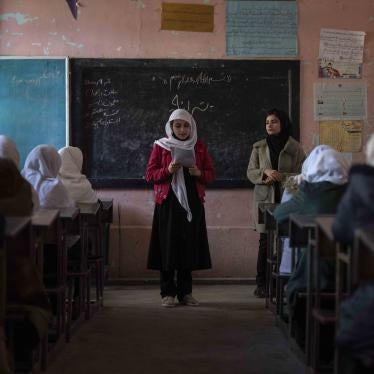A new report by the United Nations Assistance Mission in Afghanistan (UNAMA) makes for very grim reading, confirming many of the concerns Afghan human rights advocates have raised since last August, when the Taliban took control of Afghanistan.
UNAMA catalogues serious human rights abuses that Taliban forces have committed, including summary executions and enforced disappearances of former members of the Afghan National Security Forces, which have continued months after the Taliban takeover. It chronicles the series of Taliban decrees on the rights of women and girls that have given rise to “severe restrictions on their human rights, resulting in their exclusion from most aspects of everyday and public life.” And UNAMA describes how “arbitrary arrests and detention of journalists, human rights defenders, [and] protesters have had a chilling effect on freedom of the media and civic activism.”
The response from the Taliban authorities was predictable. They ignored the many cases of extrajudicial killings and enforced disappearances UNAMA documented, and they denied the Ministry of Propagation of Virtue and Prevention of Vice had “ever beaten anyone, harmed or forced anyone to do anything … or said anything to women about dress code.” Much of their response was limited to the situation of prisoners, including the peculiar and false assertion that inmates “are satisfied” with prison food. As UNAMA describes, prisoners have been routinely denied food and water as punishment. Taliban officials, who for years denounced torture by the former government and US forces, did not respond to allegations that they have also tortured prisoners, including by using electric shock.
UNAMA also notes that while civilian casualties have declined as the armed conflict has largely ended (with at least 118,443 civilians dead and wounded since UNAMA started counting in December 2008), attacks by Islamic State-linked armed groups continue to take a terrible toll, killing more than 700 civilians and wounding more than 1400 since August.
Eleven months after Afghanistan’s abrupt transition to Taliban rule, the UNAMA report demonstrates the crucial importance of continued monitoring and documentation of the steady erosion of rights in Afghanistan, and acts as an important reminder of the heavy price Afghans are paying.










